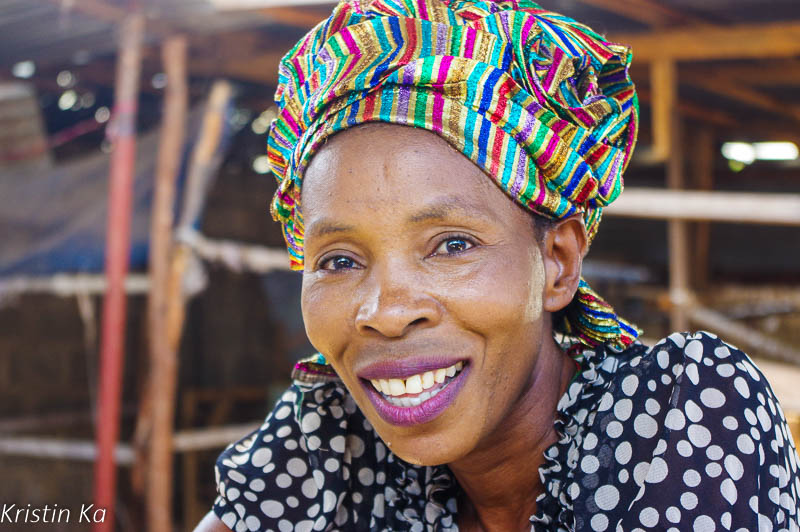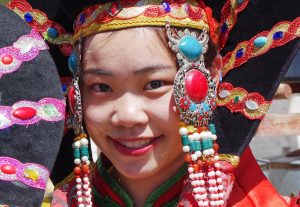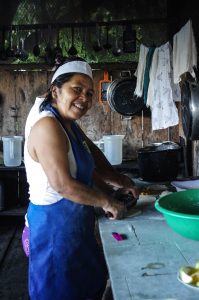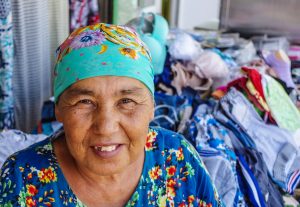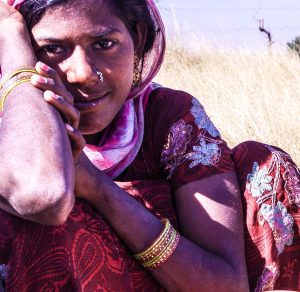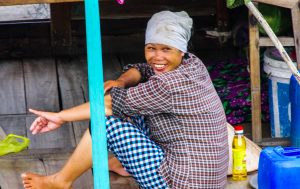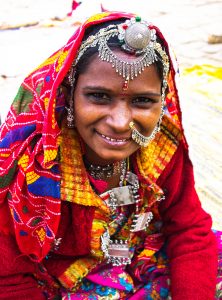I am a woman and I travel alone. I am often confronted with cultures that are very different from mine. I am sometimes stunned by their mentalities, their customs, their way of life and their willingness to conform to social or religious rules. Most of the time, I don’t judge, except of course when it comes to violence. In these cases, I rebel. But I alone cannot change the habits and customs of an entire country. I support with all my heart the women who suffer and fight to change the system that oppresses them. There is murder, stoning, forced marriages of impubescent little girls, excision, rape… We are talking about crime, violence, primitive domination and this is unacceptable.
On the other hand, I am sometimes judged myself on the way I live, the freedom I have. In other patriarchal systems, I am sometimes the victim of harsh criticism, I who run around the world, far from my children, my family and my ovens.
Sometimes you have to be far away from home, immersed in the local culture to realise that no, not all women in the world aspire to live the life of a liberated Western woman.
If there is one thing that travel can teach us, it is that we must be careful not to judge an African, Asian or American culture with European eyes
In many countries, it is tradition that chooses: women marry, have children, take care of their families and work at home. It’s not always a straitjacket, it’s sometimes a cocoon
While women are often caught in a social straitjacket defined by a patriarchal tradition, it is not only men who are the perpetrators. Many women are its guardians and work to ensure the continuation of traditions to which they are very attached. Surprisingly, but true, many women will do anything to keep their daughters on the straight and narrow and to protect them from the harmful influences of liberated women.
Indeed, following the same path as the mother is in a way comfortable and reassuring. Knowledge is valued, passed on in confidence, and it is the identity of the family that endures. Family members belong to a clan, a tribe and are never alone. They are legitimate, they have a place in the world.
This sense of belonging is very important, it is reassuring, protective.
For many young girls, starting to study things that nobody knows at home requires an enormous effort, a betrayal and a big risk of losing their place. They come out of the cocoon, sometimes find themselves quite alone and have to face the adversity of a society governed by male codes against which the family can no longer protect them.
In a traditional society, not all women want to be liberated, on the contrary
Whether it is a question of study or employment, work outside the family home is not always unanimously the wish of all women. This work is sometimes felt to be slavery, whereas for a western woman, it is staying at home to serve her family, which is slavery.
European women are role models whom they reject outright. In some countries where they have a reputation for living crushed under men’s thumb, they can also be heard pitying independent and liberated women: They have to work like goats, make children, take care of the house, work outside and on top of that they carry the rubbish!
Why suffer a boss, hours, constraints, having to continually prove their worth when a whole family needs their presence and their support? At home, they have more freedom and feel competent. At home, they also have recognition. This recognition is unconditional, it nurtures self-esteem, it is a great source of motivation and fulfilment.
I have met many women who don’t want to change the tradition. What they want is to do what they feel able to do and let men take care of the problems
They find the status of housewife reassuring even if their daily work is difficult, exhausting, they do not envy the European models at all.
The slightest domestic problem, such as a burnt-out light bulb or a broken fridge, does not concern them at all. It’s the men who have to take care of that. Just like bringing money home, it is up to the husbands to earn it and the wives to spend it.
At a time when there is more and more talk about the famous mental burden of women who have many responsibilities, one can legitimately wonder whether these housewives, locked in tradition, do not have a happier life.
In patriarchal societies, women are sometimes more present and have more authority than is initially thought
Living in the tradition, maintaining it, keeping it alive, gives women a certain power. In Egypt, in Siwa, it is the mothers who choose the wives of their sons. As long as the couple has no children, the wife is the servant subject to the mother’s authority. If the mother does not like her daughter-in-law, she can force her son to divorce her. In other words, boys often refrain from making their own choices, at the risk of creating a real family crisis. Here, women are not allowed to go out or show their faces, but they have immense power. They are of great solidarity, always ready to help each other, they charge their husbands with shopping, work and social tasks and they have great authority.
Their appearance as submissive women should not always be relied upon. This power, this influence remains secret, it takes place within the walls, in tête-à-tête. In society, they must be discreet, walk behind the husband and above all keep quiet, never antagonise the men. In private, it’s a completely different story! The house is a territory over which they reign supreme. A man will never admit that such and such a decision has been taken by his wife, in public he will take credit for it, it is a question of honour. Otherwise he will confess to being weak, unable to protect his own family.
Let us not hasten to judge this sleight of hand, in the end what counts is surely that women make their voices heard and take part in the decisions.
We must be prudent by preconceived ideas applied to traditional women
I have seen on my way women happy with their conditions, loving fathers ready to go into debt to finance their daughter’s studies. But not all women in the world dream of independence. Their freedom is elsewhere. They are much more appreciated and supported in their daily tasks than in Europe. The family is very present in their daily lives: father, mother, sisters or aunts are at their side.
As for the children’s education, in some countries it is quite normal for them to change house (to an aunt, a sister) according to the family’s needs. On a daily basis, there are almost always arms to look after the little ones if the mother is tired, works in the garden or goes shopping. The grandparents live under the same roof and the work is divided between them. In contrast to European countries, there is no nanny to pay, no time trial, no triple day: job-baby-broom.
If you live in a family in the Philippines or Saudi Arabia, you realise how lonely Western women are
Alone with their baby-blues, alone with their stress, alone with family difficulties, alone with educational issues and alone with judgements.
In these other countries, there is no shame in giving your crying baby to available arms because mummy can’t get enough, in letting ragged children play in the mud of the rice fields or asking the elders to do household chores.
If these societies seem archaic, in certain aspects they are much more benevolent towards women as they grow older. They don’t struggle with the calculation of retirement allowance and become anxious at the thought of the hospice or the desert of loneliness that awaits them. They will always have a child who will welcome them, a home where they will be useful and respected.
Whatever their way of life, all women in the world are entitled to respect and consideration
Having a family for many women is a fundamental achievement. It is wrong to judge their status as housewives as worthless. They deserve respect, empathy and consideration. Why would a Western model of a woman working outside the home be better than that of an Indian or Peruvian housewife? Their task is great, exhausting, important and fulfilling. It is worthy of the utmost respect.
Yes, but what about the freedom to make your own choices when you are a woman from a conservative country?
The world is changing and so are societies. Women who are oppressed by authoritarian systems will, I am sure, eventually change things. My heart goes out to all those who suffer and die for braving inept and useless prohibitions. Despite everything, I remain convinced that these changes take time: you can’t change the age-old structure of a human society by snapping your fingers.
While travelling, respecting culture and not judging it is essential
It is undeniable that all the women of the world cannot, like me, loudly proclaim their ideas, affirm their will, defend themselves against the injustice that crushes them. I was born French. I am one of the freest women in the world i can make my own choices. But I can’t arrive in other social systems, strengthened by the knowledge and freedom granted wich, by the way, sometimes remains debatable.
Against preconceived ideas, obscurantism, ostracism, we have to fight every day, to advance education while respecting the fragile balance of societies in constant evolution. For all this, the long journey is rich in lessons!
From all these encounters with the women of the world, Bedouin, city-dweller, peasant woman, company manager or housewife, there remains above all a deep affection for them, whatever their way of life.
